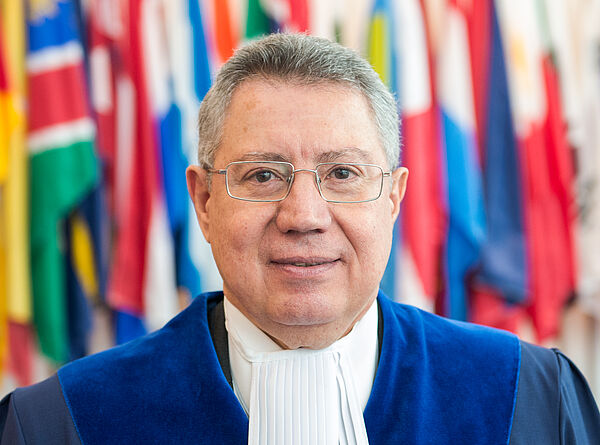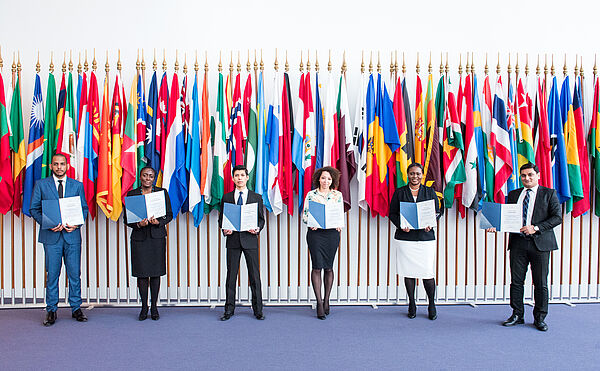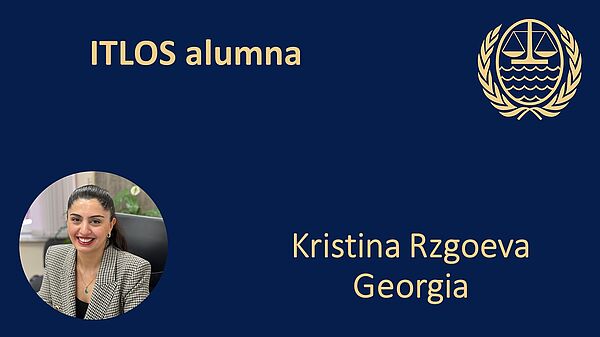Newsletter 2021/2
May 2021
Introduction
I am very pleased to share this year’s spring newsletter with you. Although COVID-19 vaccination programmes are at various stages of implementation, I am hopeful that 2021 will represent an important year in the global efforts to combat the COVID-19 pandemic. For its part, the work of the Tribunal is ongoing and the Tribunal held its Fifty-first administrative session in March with over half of the judges present in Hamburg and the others attending via video link from their homes. During the session, in addition to dealing with various legal and administrative matters, the judges amended the Rules of the Tribunal with a view to rendering them gender inclusive, and approved the documents for submission to the upcoming thirty-first Meeting of States Parties to the United Nations Convention on the Law of the Sea, among them the Annual Report, which is now available on the Tribunal’s website.
During the session the judges attended the closing ceremony of the 2020/2021 ITLOS/Nippon Foundation capacity-building programme. Six of the seven fellows were able to participate in person and present their research results at a hybrid ceremony held in the courtroom. We trust that our fellows are now in a position to advise their respective governments and institutions on the dispute-settlement procedure under the Convention and have returned to their home States with a solid knowledge of the Convention and the law of the sea. The selection of the next ITLOS/Nippon Foundation capacity-building programme fellows is underway and we are hopeful that we will be able to welcome the next group of fellows to the Tribunal in the summer months.
An important project which is ongoing on the premises and which has not been affected by the pandemic is the upgrading of the technical standards in the Tribunal's courtrooms to ensure that we can continue to offer parties to cases the highest quality of courtroom technology during oral proceedings. The installation of an interim courtroom is being finalized so that the Tribunal may proceed without interruption to its judicial work during the period when the technology in the main courtroom is being renewed. This interim courtroom will be in use from the summer, providing exactly the same advanced standard of facilities parties have become accustomed to over the years.
I hope that you enjoy reading the newsletter.
With my warmest regards,
Albert Hoffmann
President
ITLOS Cases
Proceedings in both the Dispute concerning delimitation of the maritime boundary between Mauritius and Maldives in the Indian Ocean (Mauritius/Maldives) and The M/T “San Padre Pio” (No. 2) Case (Switzerland/Nigeria) are currently ongoing. In accordance with the Rules of the Tribunal, pleadings submitted by the parties will be made available to the general public on the opening of the oral proceedings. The Tribunal makes pleadings available on the respective case page of the website as the first sitting of the oral proceedings begins and later publishes them in the series Pleadings, Minutes and Documents.
Interview with Judge Cabello Sarubbi (Paraguay)

1. With a wealth of experience in the Ministry of Foreign Affairs of Paraguay, including as a delegate at the Third United Nations Conference on the Law of the Sea, what in your view is the importance of the Tribunal for the Latin American region?
The Latin American and Caribbean States had a very important role to play in the Third United Nations Conference on the Law of the Sea. Their efforts and opinions were central to the formulation of key UNCLOS provisions in relation, for example, to the new ocean zones, such as the exclusive economic zone and the continental shelf. They were also represented at a high level in the Conference’s General Committee, one of the Conference’s presidents being Ambassador Andrés Aguilar, from Venezuela, with, in the Secretariat, Ambassador Bernardo Zuleta from Colombia, who was the Secretary-General’s Special Representative to the Conference, and Professor Hugo Caminos, Legal Adviser, from Argentina, one of the first judges of ITLOS.
These are only some examples that demonstrate the importance of the law of the sea for the region. However, the fact that States in the region have applied in relatively few cases for the jurisdiction of ITLOS could give the erroneous impression that the region gives less importance to the law of the sea. On the contrary, these States have been always fervent supporters of our institution, and the lack of cases from the region can be attributed only to reasons such as the fact that many disputes have been successfully dealt with by bilateral or regional negotiations or, when they required court intervention, the disputes had such an intense political content that the parties involved preferred to approach a more universal judicial instance, such as the International Court of Justice.
2. Despite the large ocean space surrounding South America, there are a number of Latin American States that are not party to UNCLOS. What do you think are the reasons for this?
Indeed, notable Latin American States, such as Peru, Colombia or Venezuela, which were very active during the conference, have not ratified the Convention, the reason being that its final version did not fully satisfy their original expectations.
However, I am of the opinion that in order to protect our own interests more adequately it is better to participate in a process rather than to be a mere spectator. Therefore, I am convinced that, sooner or later, these States will realize, particularly because of public opinion, that it is better to be a full party to the Convention. Before we see all those States becoming parties to UNCLOS we have to be patient, because the perception of time is not the same for individuals as for a complex political entity such as a State.
On the other hand, the provisions of UNCLOS have been so successfully formulated that they are, to a large degree, considered a central part of contemporary international law of the oceans and, in consequence, applied in their entirety also by States that have not acceded to the Convention, which is also a reason some States do not consider it necessary to act promptly.
3. UNCLOS establishes certain rights for land-locked and geographically disadvantaged States. In your opinion, what is the significance of UNCLOS to such States?
Land locked States (LLS) and geographically disadvantaged States (GDS) also participated to an outstanding extent in the Third United Nations Conference and the Group played a very important role in the final shaping of the Convention. However, here too, not all their expectations were met. As is well known, the result of negotiations generally represents the outcome of a process of mutual concessions.
However, in the particular case of the LLS at least, UNCLOS contains the most complete and authoritative recognition in history of some of their most important rights: navigation on an equal basis with all other States; transit from and to the seas; and participation in the exploitation of the resources of the oceans and the sharing of its benefits.
All of these rights are contained in a legal instrument that acquired such a broad consensus from States that it could be considered almost universal. This fact represents outstanding progress also for those States whose rights in the past were the subject only of bilateral, regional or general conventions, with a very small following.
4. Part X of UNCLOS is dedicated to the right of access of land-locked States to and from the sea and article 125 thereof determines that the States concerned should enter into bilateral, sub-regional or regional agreements on the "terms and modalities for exercising freedom of transit". How do you see the process of negotiating such agreements in relation to your country?
Article 125, paragraph 2, of UNCLOS specifically states that “[t]he terms and modalities for exercising the freedom of transit shall be agreed between the land-locked States and transit States concerned” through specific conventions. Paraguay, like all other LLS, considers the conclusion of such agreements a cardinal feature of their foreign policy.
However, not all such States are in the same position for reaching the best results. In the case of my country, as a State member of MERCOSUR, as the process for integration in MERCOSUR approaches finalization, complete equality in the enjoyment of the rights of circulation of persons, goods and services will be reached. That outcome will mean that the transit conditions of my country will be the same as those granted to any internal part of the territory of the coastal States that are parties to MERCOSUR.
5. What advice do you have for young Latin American diplomats and scholars interested in the law of the sea?
In most LAC countries information or training in matters related to the law of the sea is not easily accessible. Of course, there are some notable exceptions (such as the larger States in the region: Mexico, Brazil and Argentina). Therefore, my advice to young diplomats or scholars in our part of the world would be to visit the information platforms offered by our Tribunal, such as its website or other Internet links, and to keep up to date with the many options for capacity building that are currently on offer, such as the ITLOS/Nippon programme, the IFLOS Summer Academy or the internship programme. Of course they should also explore further options offered by other prestigious institutions, such as the International Maritime Law Institute in Malta, the training institute of the International Maritime Organization that has developed appealing training programmes on all aspects of maritime and oceans law.
Another important consideration is that all these programmes also include generous financial assistance in the form of grants or fellowships which are accessible to students from low-income countries.
Capacity Building

We are pleased to note that a number of our capacity-building programmes have continued despite the constraints imposed by the pandemic.
ITLOS-Nippon capacity-building and training programme on dispute settlement under UNCLOS
The fellows completed their research papers and presented them to the Judges at two ceremonies held on 18 and 25 March 2021. The fellows' topics were as follows:
- Ms Sandrine De Herdt: L’exploration et exploitation du plateau continental au-delà de 200 M en l’absence de recommandations de la Commission des limites du plateau continental
- Ms Mercy Afandi Olando: The role of hydrocarbons in maritime delimitation: A case study of the Kenya/Somalia maritime boundary dispute
- Mr Edgar Eduardo Noriega Herrera: The protection of the rights and interests of third States in maritime delimitation cases
- Mr Nishat Rahimov: Civil and criminal jurisdiction of coastal States for environmental pollution in the EEZ and the jurisdiction of ITLOS
- Mr Ricardo Paredes: Limitations on the right of innocent passage of nuclear and radioactive cargoes in the Caribbean Sea: Case study of the Dominican Republic
- Ms Martha Amelia Sesay: The extension of the continental shelf beyond 200NM and its implications for States with adjacent coasts - A case study of the Sierra Leone/Liberia situation
- Mr Mohammad Zulhilmie Norazman: South China Sea disputes: Malaysia’s perspectives and approaches
The fellows spent the last weeks of the programme finalizing their research papers for submission and enjoying a whistle-stop virtual tour of various institutions in London, The Hague, Brussels and Kiel. The fellows enjoyed the opportunity to “visit” the International Court of Justice, the Permanent Court of Arbitration, the International Criminal Court, the International Maritime Organization, the OSPAR Commission, the North East Atlantic Fisheries Commission and the European Commission's DG Mare.
Internship programme
The internships of Ms Chiara Pavesi (Italy) and Mr Kohji Hayakawa (Japan) with the Legal Office ended with the presentation of their research papers, “An investigation into the concept of distress and the right to access to ports in the context of the SARS CoV-2 pandemic” and “How should we interpret a recipe of rocks and islands? – Article 121 of UNCLOS and the South China Sea Arbitration”, respectively. Since their departure, two new interns have joined the Tribunal, Sarah-Marie Thomas in the Press Office and Michail Michailides in the Legal Office.
IFLOS Summer Academy
The organizers of the IFLOS Summer Academy have decided that this year's programme will take place online and in a reduced format for the 2020 and 2021 applicants.
Alumni Network
The network is growing stronger by the month. Each presentation brings together alumni from various positions connected with the law of the sea and in diverse stages of their careers (not to mention time zones). Recent presentations have been given by: Massimo Lando, "Identifying the relevant coast and the relevant area in maritime delimitation"; Rob Steenkamp, “Geoengineering, international law, and the ocean"; Victor Ventura, “The practical consequences of insufficient regulation of article 82 of UNCLOS for States and the International Seabed Authority"; and Ekaterina Antsyngina, “The prohibition of bottom trawling on extended continental shelves: Creeping jurisdiction or enforcement of sovereign rights?" A first round table event on “International fisheries law and practice”, involving Buba Bojang, Strahinja Ivanovic and Vivien Deloge, alumni now working at the Food and Agriculture Organization of the United Nations, the World Trade Organization, and the Pew Charitable Trusts, respectively, was met with great interest and we hope to pursue this format for future events.
Meet the ITLOS Alumni

Kristina Rzgoeva (Georgia), Nippon Fellow in 2015/2016, Head of Legal Division, Maritime Transport Agency, Ministry of Economy and Sustainable Development of Georgia
ITLOS completely changed my life.
I first came to the Tribunal as a visitor in 2014 while on a business trip and attending a training session in Hamburg. I fell in love with the atmosphere there and avidly followed the news and announcements of capacity-building programmes I could follow at the Tribunal. Therefore, when I got a chance to apply for the ITLOS/Nippon Fellowship Programme in 2015 I did so without any hesitation.
At that time, I was already working as the Head of Legal Division of the Maritime Transport Agency (MTA) of Georgia, which is the only regulatory body for maritime transport in Georgia. At the same time, I was enrolled in a Master’s programme at university, working on the topic of maritime delimitation between Georgia and the Russian Federation. Maritime delimitation is a very sensitive topic for Georgia and, as the Director of the MTA is involved in the delimitation negotiations process, I was responsible for providing advice on the issue. I could not find a better place than ITLOS to broaden my knowledge!
Participating in the fellowship programme was a benchmark moment for me. Along with the knowledge and experience I gained during the fellowship I also had the opportunity to meet the judges and communicate with them, receiving advice and attending hearings - this is what makes the programme so exclusive and irreplaceable. The fellowship helped me to broaden my knowledge and become one of the few law of the sea specialists in Georgia. It gave me confidence in myself and facilitated the decision-making part of my work.
Returning from ITLOS, in addition to my position at the MTA, I was invited to be a lecturer at Batumi State Navigation University, where I have been giving lectures on the law of the sea. Also, as maritime education is regulated by legislation and has to be supervised and monitored by the relevant body, I have been involved with the Ministry of Education and Science of Georgia as a field expert in maritime education. Based on this experience, I was recently appointed a Member of Council of Authorization of Vocational Education Institutions by Order of the Prime Minister of Georgia, which is a very great honour and responsibility for me. It helps me to contribute to the development of maritime education and vocational education in other fields overall on the territory of Georgia.
In addition, I became a founder member of the Women in International Shipping and Trade Association (WISTA), which helped me to enrich my contacts all over the world and gave me the opportunity to participate in the conference “Empowering women in the maritime community”, held at the World Maritime University in Malmö, with a large participation of women who influence the maritime industry. And in 2018, I became a Rhodes Academy fellow, which once again has given me the opportunity to meet ITLOS judges and other professionals from the maritime field, helping me strengthen my knowledge and broaden my contacts.
All the above, without any doubt, is thanks to the ITLOS/Nippon Fellowship programme which gave me knowledge, experience and confidence in myself and helped me to contribute to developing the maritime field in my country.
Upcoming Events
Meeting of State Parties: 21 to 25 June 2021 (tbc).
The United Nations Open-ended Informal Consultative Process on Oceans and the Law of the Sea, Twenty-first meeting: "Sea-level rise and its impacts" will be held from 14 to 18 June 2021.

